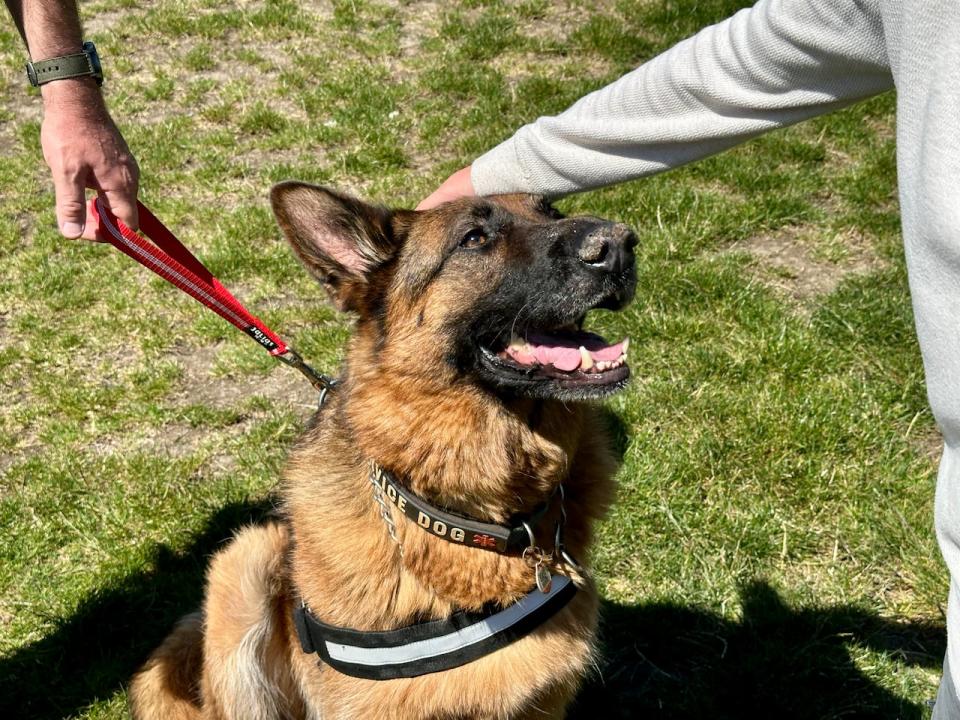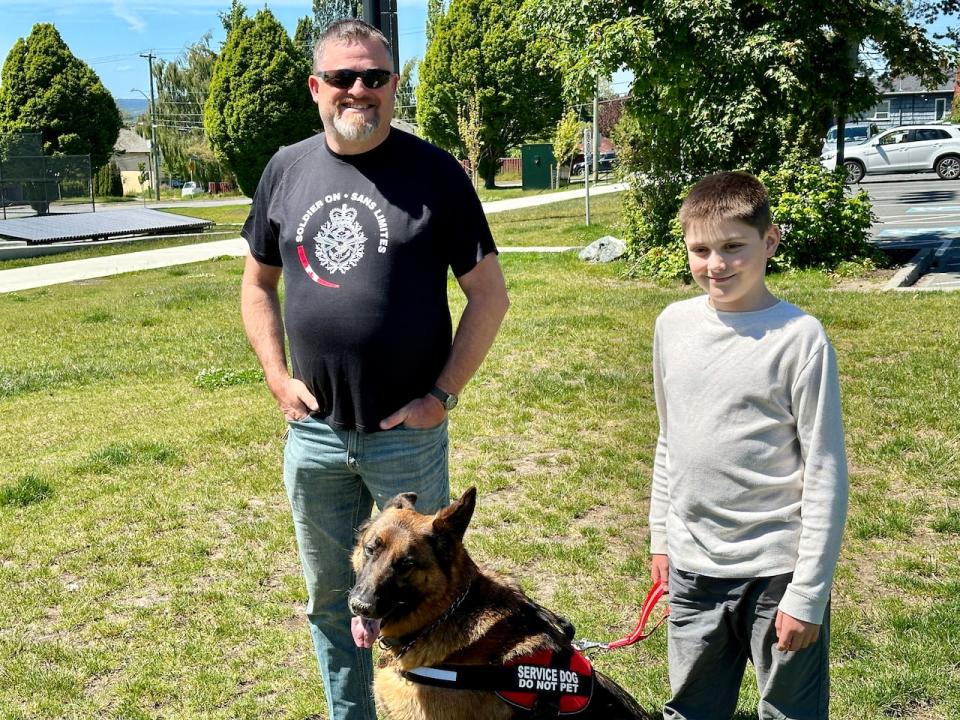Unclear guidelines force family to travel without service dog

A Vancouver Island woman says her family recently had to travel without her son's certified service dog because she could not get a straight answer on whether WestJet would let the dog on the plane.
Michael Toulmin, 8, is autistic and gets overwhelmed by crowds, noise, bright lights, and a change in location or routine.
His dog Thor helps him calm down and regulate his behaviour.
But his parents say they had no choice but to leave the dog at home when they went on a family trip to Mexico earlier this year, flying with WestJet.
WestJet allows service dogs for persons with disabilities that have been trained as service dogs.
The airline asks that customers call at least 48 hours before their flight to arrange access for the dog, and says they should be prepared to provide documentation as well as the dog's breed and size so that appropriate floor space can be provided.
If a dog doesn't fit at its owner's feet, it may need an extra seat.
For flights within Canada, that seat is free. For international flights, customers may be charged.

Thor, a service dog certified by the province of B.C., receives a pet from his handler, eight-year-old Michael Toulmin, while Michael's father, William, holds the lead. (Kathryn Marlow/CBC)
Michael's father, William Toulmin, said they were aware that Thor, a German shepherd, would need extra room, and they were prepared to pay if needed.
But when his wife, Michelle Andrews, phoned several weeks ahead to make arrangements, she said all she was told was that the dog was too big and that they would have to leave the decision to the discretion of the check-in or gate agents at the airport.
The family lives in Port Renfrew, B.C., a small community 79 kilometres from Victoria on the southwest coast of Vancouver Island.
To get to Vancouver International Airport for their flight, they needed to drive for approximately two hours, then take a 90-minute ferry ride, then drive for about another 30 minutes.
Because they didn't want to risk travelling all that way and then being told they couldn't get their dog on the flight, they decided to leave Thor at home.

William Toulmin, his son Michael, and Michael's service dog Thor. The family recently went on vacation without the dog, because they say they could not get a firm answer from WestJet about whether the dog would be allowed on their flight. (Kathryn Marlow/CBC)
"It was a really, really, hard decision for us to make," said Andrews, with tears in her voice.
She said Michael had a hard time understanding why his companion couldn't come with them — and he had a hard time dealing with the anxiety he felt while on the trip.
It was the first vacation the family had ever taken outside of Canada and the United States, but Andrews said it didn't feel like a vacation.
"It was a very difficult trip," she said, "because we didn't have the tools that we usually have to make things enjoyable for my son."
She said her frustration would have been eased if she had just gotten a clear answer about whether the dog would be accepted on the flight or if the airline's website had laid out the size restrictions so she could have known in advance.
In an emailed response to CBC News, WestJet spokesperson Julia Brunet wrote: "We apologize for the confusion. These reservations should be confirmed in advance of travel to ensure a seamless travel journey."
She also asked for further information so the airline could try to understand why the confusion occurred.
Lack of clarity in guidelines
Meredith Areskoug, who works for Pacific Assistance Dogs Society (PADS), a B.C.-based organization which trains and provides service dogs for people with disabilities, said overall, Canadian airlines are being increasingly accommodating when it comes to service dogs — but there are still challenges.
When an additional seat is needed to ensure floor space for the dog, Canadian airlines are required to provide it free of charge for domestic flights but can charge for international flights.
While she's heard instances of airlines waiving the fees on international flights, she's also heard of them charging on domestic flights.
There can also be discrepancies in how accommodation is provided, because of the definition of service dog.
According to Canadian law, airlines must accommodate a service dog that has been "individually trained by an organization or person specializing in service dog training to perform a task to assist the person with a disability with a need related to their disability."
In British Columbia, a dog can be certified as a service dog even if it has been trained by its owner, as long as it passes a standardized test showing it can behave in public and obey instructions.
Areskoug said it can all make travel even more challenging than it already is for people with disabilities.
"It's very confusing. It's very difficult, and it's very stressful."
She recommends people do their homework and plan ahead.
As for the Port Renfrew family?
William Toulmin agrees. He said the earlier you do your homework and approach the airline, the more time you'll have to advocate if you hit barriers.


